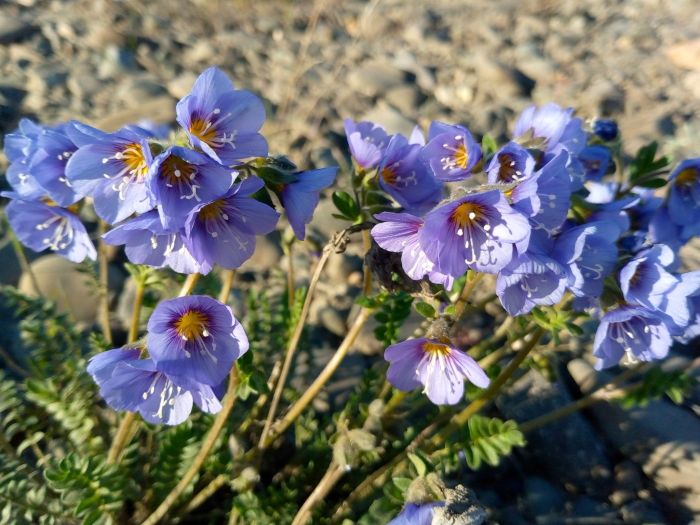Northern Jacob’s-Ladder
(Polemonium boreale)
Northern Jacob’s-Ladder (Polemonium boreale)
/
/

© Сергей Голубев
CC BY 4.0
Image By:
© Сергей Голубев
Recorded By:
Copyright:
CC BY 4.0
Copyright Notice:
Photo by: © Сергей Голубев | License Type: CC BY 4.0 | License URL: http://creativecommons.org/licenses/by/4.0/ | Uploader: geokefir | Publisher: iNaturalist |

























Estimated Native Range
Summary
Polemonium boreale, commonly known as Northern Jacob’s-ladder or Boreal Jacob’s-ladder, is a perennial herb native to the high Arctic tundra, including regions of Greenland, northern Canada, Russia, and Svalbard. This diminutive plant typically grows to a height of 2-4 inches (5-10 cm) with pubescent, glandular stems and pinnate leaves that are adapted to the extreme conditions of its native habitat. It produces small, blue, bell-shaped flowers that bloom in the short Arctic summer, adding a touch of color to the stark landscape. Despite its delicate appearance, Northern Jacob’s-ladder is a hardy species that thrives in gravelly slopes, rocky crevices, and scree, where it endures freezing temperatures and limited nutrients.
Northern Jacob’s-ladder is valued for its ability to survive in extreme environments and is of interest to alpine and rock garden enthusiasts who wish to replicate such conditions. Its small stature and unique habitat requirements make it less common in general cultivation, but it can be a conversation piece in specialized plant collections. It requires well-drained, rocky or sandy soil and can tolerate full sun to partial shade. While it is not known for any significant horticultural problems, its rarity and specialized growing conditions can make it a challenge to cultivate. It is not typically associated with any culinary or medicinal uses.CC BY-SA 4.0
Northern Jacob’s-ladder is valued for its ability to survive in extreme environments and is of interest to alpine and rock garden enthusiasts who wish to replicate such conditions. Its small stature and unique habitat requirements make it less common in general cultivation, but it can be a conversation piece in specialized plant collections. It requires well-drained, rocky or sandy soil and can tolerate full sun to partial shade. While it is not known for any significant horticultural problems, its rarity and specialized growing conditions can make it a challenge to cultivate. It is not typically associated with any culinary or medicinal uses.CC BY-SA 4.0
Plant Description
- Plant Type: Herb
- Height: 0.8-1 feet
- Width: 0.8-1 feet
- Growth Rate: Moderate
- Flower Color: Blue
- Flowering Season: Summer
- Leaf Retention: Deciduous
Growth Requirements
- Sun: Full Sun, Part Shade
- Water: Medium
- Drainage: Medium
Common Uses
Border Plant, Low Maintenance, Rock Garden
Natural Habitat
native to the high Arctic tundra, including regions of Greenland, northern Canada, Russia, and Svalbard
Other Names
Common Names: Boreal Jacob’s-Ladder , Arctic Jacob’s Ladder
Scientific Names: Polemonium boreale , Polemonium arcticum , Polemonium boreale subsp. boreale , Polemonium boreale subsp. genuinum , Polemonium boreale subsp. humile , Polemonium boreale subsp. hyperboreum , Polemonium boreale subsp. macranthum , Polemonium boreale subsp. nudipedum , Polemonium boreale subsp. richardsonii , Polemonium boreale var. boreale
GBIF Accepted Name: